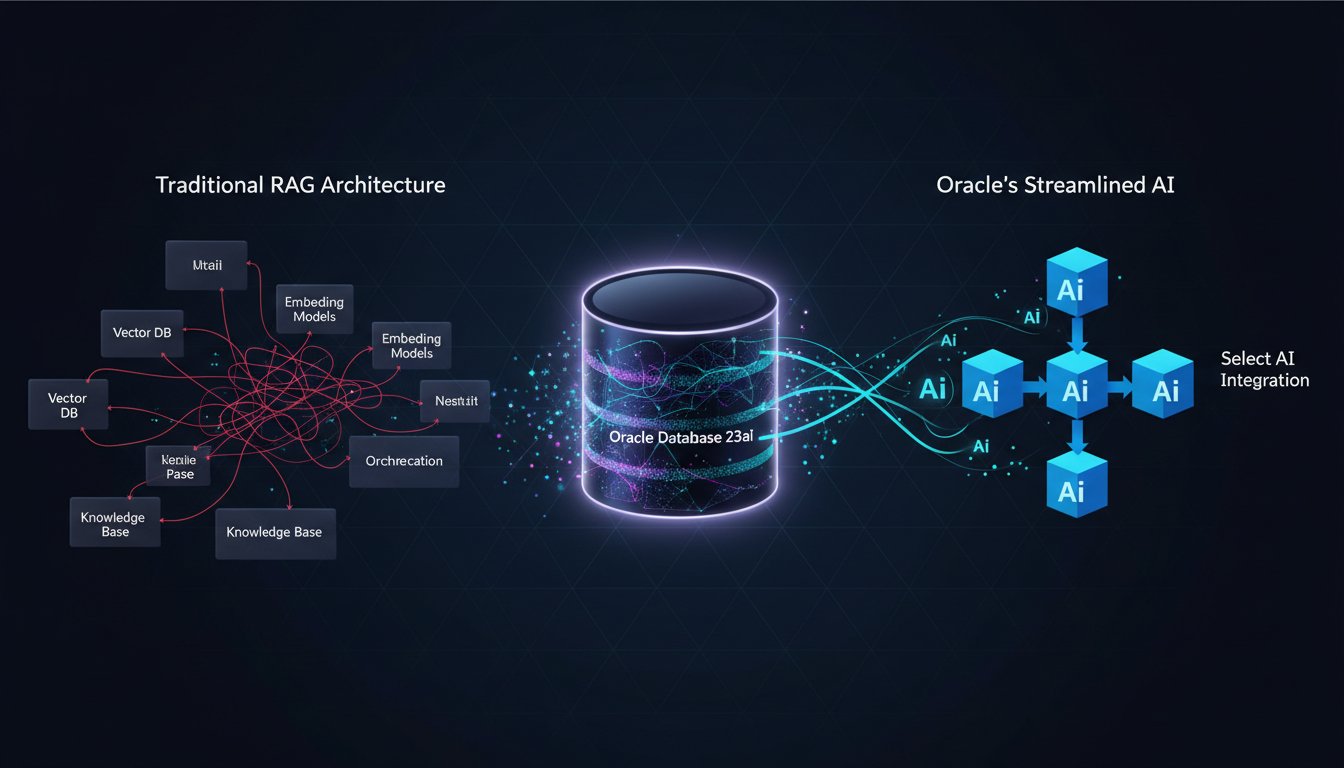Enterprise organizations are drowning in unstructured data while their AI systems struggle to provide accurate, contextual responses. A Fortune 500 financial services company recently discovered that their customer service chatbot was providing outdated policy information 40% of the time, leading to compliance violations and customer frustration. The culprit? A fragmented RAG system that couldn’t handle their diverse data sources or scale with their growing knowledge base.
This scenario plays out across industries daily. Companies invest heavily in AI initiatives, only to find their retrieval systems can’t deliver the precision and reliability demanded by enterprise workflows. The challenge isn’t just technical—it’s architectural. Traditional RAG implementations often buckle under the complexity of enterprise requirements: multi-format document processing, real-time updates, compliance tracking, and seamless integration with existing systems.
Amazon Bedrock emerges as a game-changing solution for these enterprise RAG challenges. Unlike point solutions that address individual components, Bedrock provides a comprehensive foundation model service that enables organizations to build sophisticated, production-ready RAG systems without the typical infrastructure headaches. By leveraging multiple foundation models through a single API, enterprises can create resilient systems that adapt to diverse use cases while maintaining the security and scalability requirements of modern business.
This guide will walk you through building a complete enterprise RAG system using Amazon Bedrock, covering everything from multi-model architecture design to advanced retrieval strategies. You’ll discover how to implement knowledge base management, handle complex document types, and create self-improving systems that evolve with your organization’s needs.
Understanding Amazon Bedrock’s RAG Architecture
Amazon Bedrock fundamentally reimagines how enterprises approach RAG system development by providing serverless access to multiple foundation models through a unified interface. This architecture eliminates the traditional bottlenecks of model hosting, fine-tuning infrastructure, and cross-model compatibility that plague custom RAG implementations.
The Multi-Model Advantage
Bedrock’s support for models from Anthropic, Cohere, Meta, Stability AI, and Amazon creates unprecedented flexibility for enterprise RAG systems. Different models excel at different tasks: Claude excels at complex reasoning and analysis, Cohere’s Command models provide superior summarization capabilities, while Amazon’s Titan models offer cost-effective embedding generation for large-scale retrieval tasks.
This multi-model approach allows enterprises to optimize for specific use cases within a single system. A legal document analysis workflow might use Claude for contract interpretation while leveraging Titan embeddings for efficient document retrieval. This architectural flexibility ensures optimal performance across diverse enterprise scenarios without vendor lock-in.
Knowledge Bases as a Service
Bedrock’s Knowledge Bases feature transforms traditional vector database management into a managed service. Instead of maintaining complex embedding pipelines and vector storage infrastructure, organizations can focus on knowledge curation and retrieval optimization. The service automatically handles document ingestion, chunking strategies, and embedding generation while providing enterprise-grade security and compliance features.
The knowledge base service integrates seamlessly with Amazon S3, enabling organizations to leverage existing data lakes and document repositories. This integration eliminates data migration overhead while providing automatic synchronization capabilities that keep knowledge bases current with source document changes.
Implementing Multi-Source Data Ingestion
Enterprise RAG systems must handle diverse data sources ranging from structured databases to unstructured documents, real-time feeds, and multimedia content. Bedrock’s architecture supports this complexity through flexible ingestion patterns that accommodate various data formats and update frequencies.
Document Processing Pipeline
Create a robust document processing pipeline that handles multiple formats while maintaining semantic integrity. Start by implementing format-specific processors for common enterprise document types:
import boto3
import json
from typing import Dict, List, Any
class BedrockRAGProcessor:
def __init__(self):
self.bedrock = boto3.client('bedrock-runtime')
self.s3 = boto3.client('s3')
def process_documents(self, bucket_name: str, prefix: str) -> Dict[str, Any]:
"""Process documents from S3 bucket into knowledge base"""
documents = self._extract_documents(bucket_name, prefix)
processed_chunks = []
for doc in documents:
chunks = self._intelligent_chunking(doc)
enriched_chunks = self._enrich_metadata(chunks)
processed_chunks.extend(enriched_chunks)
return self._create_knowledge_base_entries(processed_chunks)
The intelligent chunking strategy should consider document structure, semantic boundaries, and enterprise-specific requirements like regulatory compliance markers or confidentiality levels. This approach ensures that retrieved content maintains context while respecting organizational policies.
Real-Time Data Synchronization
Implement event-driven synchronization to keep knowledge bases current with source data changes. Use Amazon EventBridge to trigger updates when documents are modified, ensuring your RAG system reflects the most current information available.
Configure automatic reprocessing workflows that detect semantic changes in updated documents and selectively update relevant knowledge base entries. This selective updating approach minimizes computational overhead while maintaining system accuracy.
Advanced Retrieval Strategies for Enterprise Scale
Enterprise RAG systems require sophisticated retrieval strategies that go beyond simple similarity search. Bedrock enables implementation of hybrid retrieval approaches that combine multiple search methodologies for optimal results.
Hybrid Search Implementation
Combine dense vector retrieval with keyword-based search to capture both semantic similarity and exact term matches. This hybrid approach proves essential for enterprise scenarios where precise terminology and conceptual understanding both matter.
def hybrid_retrieval(self, query: str, knowledge_base_id: str) -> List[Dict]:
"""Implement hybrid retrieval combining vector and keyword search"""
# Dense vector retrieval
vector_results = self.bedrock.retrieve(
knowledgeBaseId=knowledge_base_id,
retrievalQuery={'text': query},
retrievalConfiguration={
'vectorSearchConfiguration': {
'numberOfResults': 20,
'overrideSearchType': 'SEMANTIC'
}
}
)
# Keyword-based filtering
keyword_results = self._keyword_filter(query, vector_results)
# Combine and rerank results
combined_results = self._rerank_results(vector_results, keyword_results)
return combined_results[:10]
Context-Aware Ranking
Implement ranking algorithms that consider user context, document freshness, and organizational hierarchy. Enterprise users often need results prioritized based on their role, department, or current project context. Bedrock’s flexible architecture allows integration of custom ranking models that incorporate these enterprise-specific signals.
Develop ranking models that learn from user feedback and interaction patterns. Track which retrieved documents prove most valuable for specific query types and adjust ranking accordingly. This continuous learning approach improves system performance over time while adapting to changing organizational needs.
Building Self-Improving Knowledge Systems
Enterprise RAG systems must evolve continuously to maintain relevance and accuracy. Implement feedback loops that capture user interactions and system performance metrics to drive automatic improvements.
Feedback Integration Architecture
Create comprehensive feedback collection mechanisms that capture both explicit user feedback and implicit behavioral signals. Track metrics like document utilization rates, query reformulation patterns, and task completion success rates to identify system improvement opportunities.
class FeedbackProcessor:
def __init__(self, bedrock_client):
self.bedrock = bedrock_client
self.metrics_store = boto3.client('cloudwatch')
def process_interaction(self, query: str, retrieved_docs: List,
user_feedback: Dict) -> None:
"""Process user interaction for system improvement"""
# Log interaction metrics
self._log_retrieval_metrics(query, retrieved_docs)
# Process explicit feedback
if user_feedback.get('relevance_scores'):
self._update_relevance_models(query, retrieved_docs,
user_feedback['relevance_scores'])
# Analyze implicit signals
self._analyze_behavioral_patterns(user_feedback.get('session_data', {}))
Automated Knowledge Gap Detection
Implement systems that identify knowledge gaps by analyzing failed queries and low-confidence responses. Use Bedrock’s model capabilities to generate synthetic training data for underrepresented topics, improving system coverage over time.
Develop gap detection algorithms that monitor query patterns and success rates across different knowledge domains. When certain topic areas show consistently poor performance, automatically flag them for content acquisition or knowledge base enhancement.
Security and Compliance Integration
Enterprise RAG systems must meet stringent security and compliance requirements while maintaining performance and usability. Bedrock provides enterprise-grade security features that integrate seamlessly with organizational policies.
Access Control and Data Governance
Implement fine-grained access controls that respect organizational hierarchies and data classification levels. Use AWS IAM integration to ensure users only access information appropriate to their roles and clearance levels.
class SecureRAGAccess:
def __init__(self):
self.iam = boto3.client('iam')
self.bedrock = boto3.client('bedrock-runtime')
def secure_query(self, user_context: Dict, query: str) -> Dict:
"""Execute query with security context"""
# Validate user permissions
allowed_sources = self._get_user_data_sources(user_context)
# Filter knowledge base access
filtered_kb_config = self._apply_access_filters(
user_context['clearance_level'],
allowed_sources
)
# Execute retrieval with security constraints
results = self._secure_retrieval(query, filtered_kb_config)
# Apply output filtering
return self._filter_sensitive_content(results, user_context)
Audit Trail and Compliance Monitoring
Maintain comprehensive audit trails that track all system interactions, data access patterns, and model responses. This logging capability proves essential for regulatory compliance and security incident investigation.
Implement automated compliance monitoring that flags potential violations of data handling policies or access control breaches. Use CloudWatch and AWS Config to create compliance dashboards that provide real-time visibility into system security posture.
Performance Optimization and Scaling
Enterprise RAG systems must handle varying loads while maintaining consistent response times. Bedrock’s serverless architecture provides automatic scaling, but optimization strategies can significantly improve cost efficiency and user experience.
Caching and Response Optimization
Implement intelligent caching strategies that balance response speed with information freshness. Cache frequently accessed knowledge base results while ensuring time-sensitive information remains current.
class OptimizedRAGCache:
def __init__(self):
self.elasticache = boto3.client('elasticache')
self.cache_ttl_strategy = {
'static_policies': 86400, # 24 hours
'dynamic_data': 3600, # 1 hour
'real_time_feeds': 300 # 5 minutes
}
def cached_retrieval(self, query: str, data_type: str) -> Dict:
"""Implement intelligent caching for RAG queries"""
cache_key = self._generate_cache_key(query, data_type)
cached_result = self._get_cached_response(cache_key)
if cached_result and self._is_cache_valid(cached_result, data_type):
return cached_result
# Execute fresh retrieval
fresh_result = self._execute_bedrock_query(query)
# Cache with appropriate TTL
self._cache_response(cache_key, fresh_result,
self.cache_ttl_strategy[data_type])
return fresh_result
Load Balancing and Model Selection
Implement dynamic model selection that routes queries to optimal foundation models based on query complexity, current load, and cost considerations. This approach maximizes both performance and cost efficiency across diverse enterprise workloads.
Develop load balancing algorithms that consider model-specific strengths and current capacity. Route complex analytical queries to Claude while handling routine factual queries with more cost-effective models like Cohere Command.
Building production-ready RAG systems with Amazon Bedrock transforms enterprise knowledge management from a technical challenge into a strategic advantage. The comprehensive architecture we’ve explored—from multi-model flexibility to automated knowledge gap detection—provides the foundation for systems that not only meet current enterprise needs but evolve with organizational growth.
The key to success lies in treating RAG implementation as an ongoing journey rather than a destination. Start with core retrieval functionality, then systematically add advanced features like hybrid search, self-improvement mechanisms, and comprehensive security controls. This iterative approach ensures your system delivers immediate value while building toward enterprise-grade sophistication.
Ready to transform your organization’s knowledge infrastructure? Begin by implementing the basic Bedrock knowledge base integration outlined in this guide, then gradually incorporate the advanced patterns that align with your specific enterprise requirements. The combination of Bedrock’s managed services and the architectural patterns we’ve covered will position your organization to leverage AI-powered knowledge systems that scale with confidence and deliver measurable business impact.




